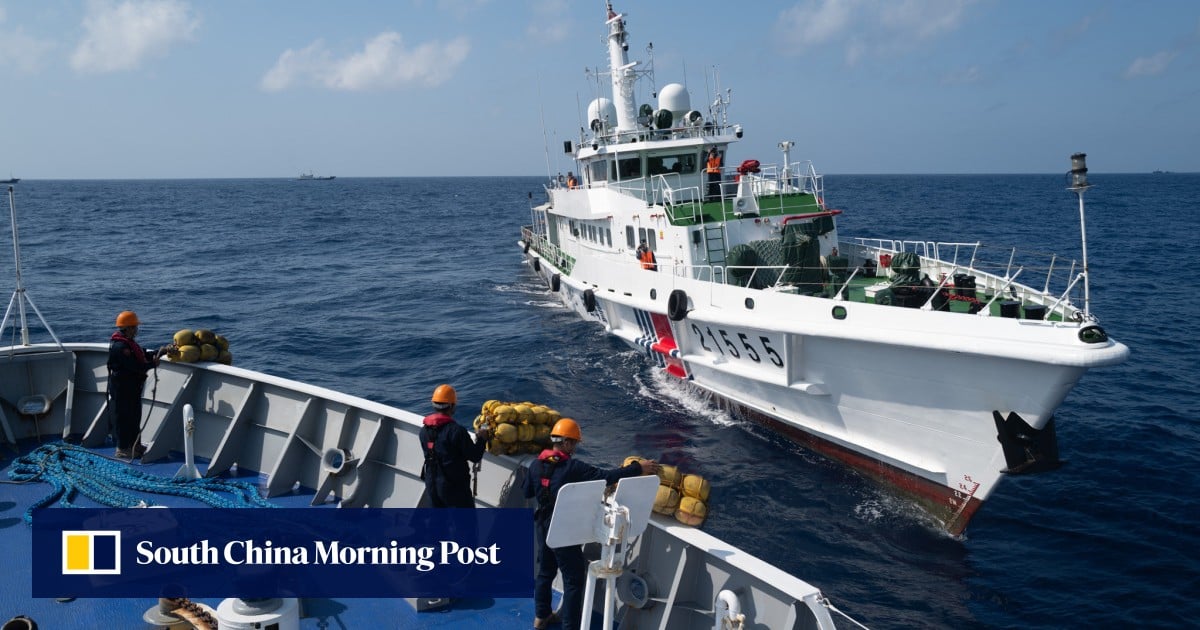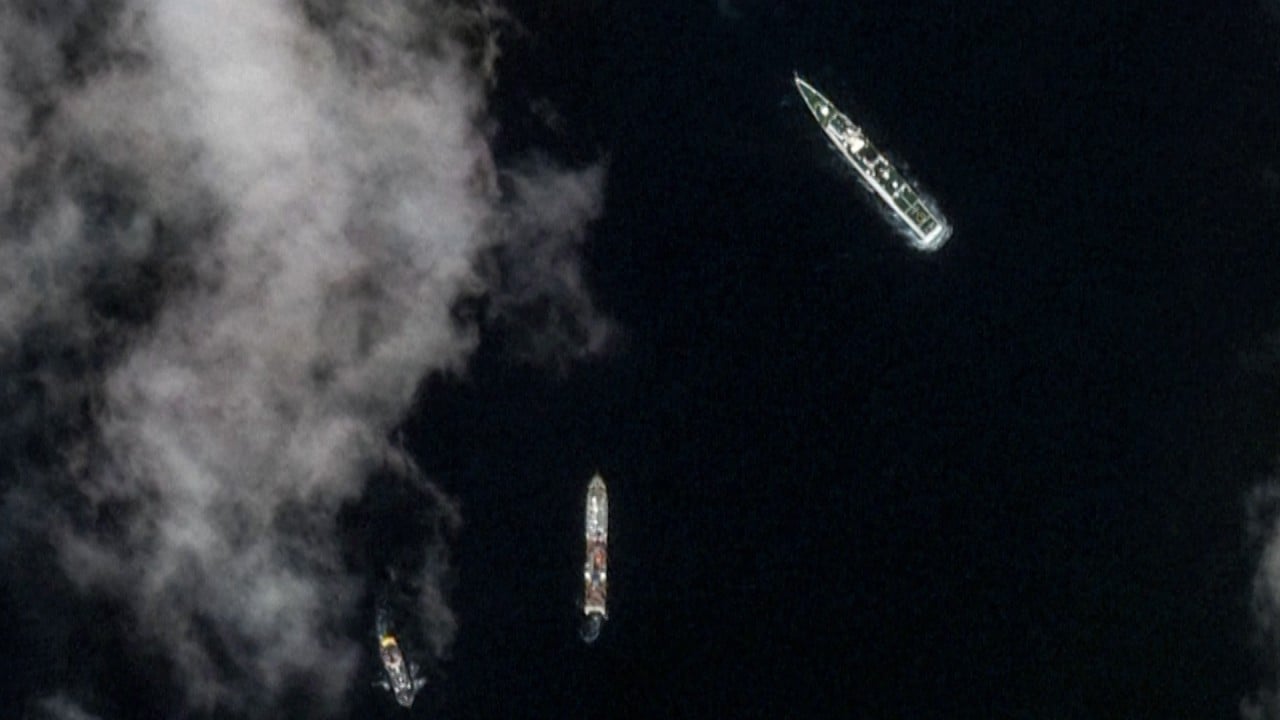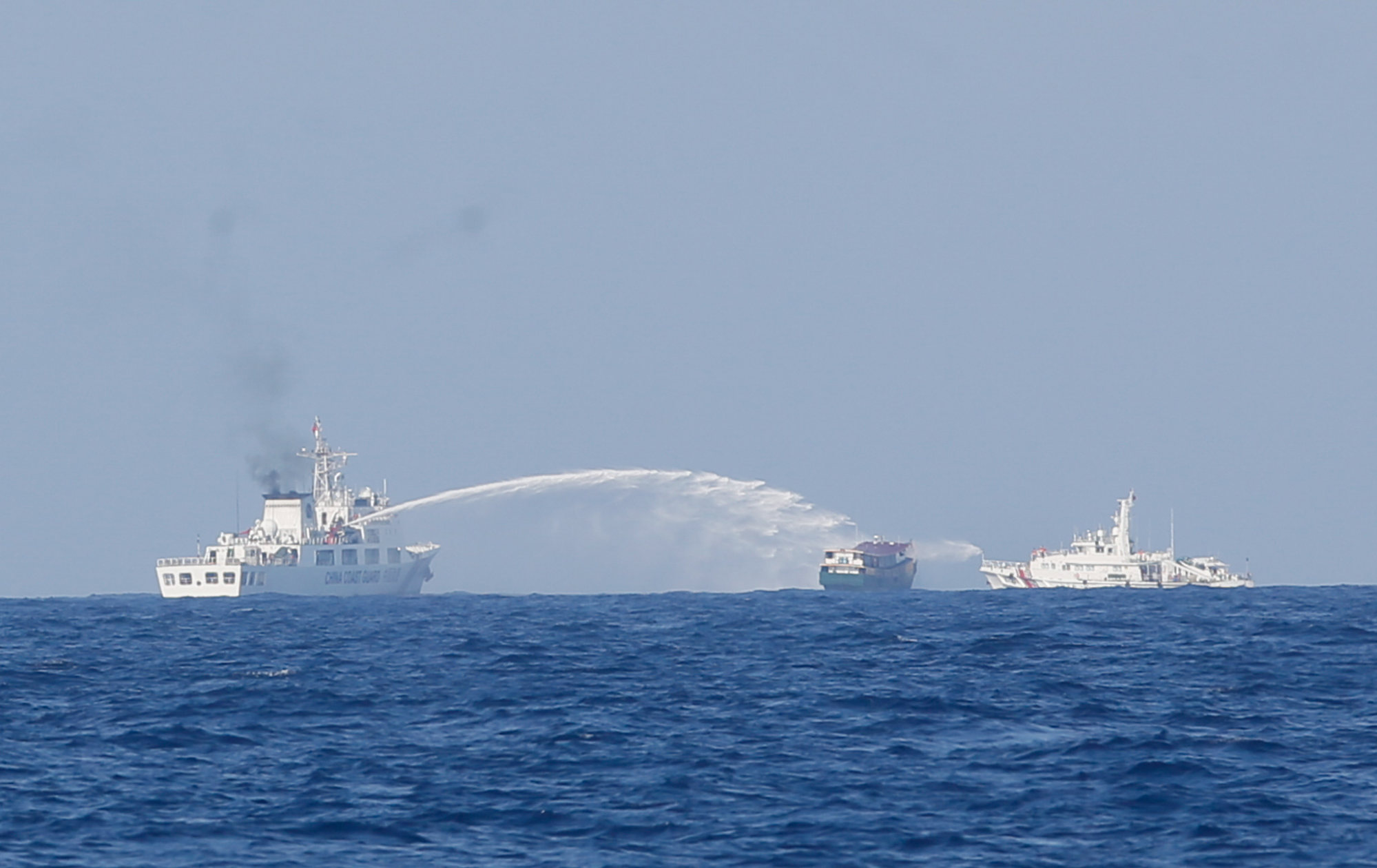
The embedded reporters captured photos and videos of CCG and militia vessels blocking the resupply mission’s ships, including the PCG’s BRP Sindangan and BRP Cabra, which were escorting the Uniza May 4. The foreign reporters were on board the BRP Sindangan while their Philippine counterparts were observing from the BRP Cabra.
Later, more CCG and militia ships arrived at the shoal, where they prevented the Philippine wooden supply boat from getting closer to the BRP Sierra Madre. The incident proceeded like a cat-and-mouse chase until two CCG vessels fired their water cannons at the Philippine boat, causing severe damage to it and minor injuries to three personnel on board.
Edward Stephan Bangubung, a Philippine freelance photographer, said what he witnessed was a life-threatening incident.
“I am excited to cover the resupply mission but I am afraid too,” Bangubung said, noting that while the Philippine supply boat was on the way to its destination, two PCG ships were shadowed by a Chinese Navy ship.
Filipino journalist’s AI tool for in-depth reporting challenges industry fears
Filipino journalist’s AI tool for in-depth reporting challenges industry fears
Another journalist covering the mission, Marconi Navales, said that he also saw how China tried “aggressively” to stop Manila’s resupply mission. Navales said he took photographs of a hole on a CCG vessel when it rammed one of the escort ships.
“We were surrounded by Chinese ships in the middle of the ocean. You have to pay attention to which part they are going to hit … from the front or at the back,” Navales said.
“The Philippines was outnumbered. From my end, I was afraid. I saw how the Philippine coastguard and navy tried their best [to counter CCG’s actions],” he added.
Maritime security expert Ray Powell told This Week in Asia that China has no grand designs for the Second Thomas Shoal other than to chase the Philippine Navy away from it.
“With the Mischief Reef so nearby, there’s no real need for another Chinese base. The BRP Sierra Madre poses no threat to China’s position,” said Powell, who is a retired US Air Force officer.
Beijing is betting on boosting national prestige for its blockade strategy and wanted to demonstrate to Manila that resistance is futile, according to Powell.
“Its audience is not just Manila but every other regional country that might dare to take its stand. To quote the old Chinese saying, Beijing aims to ‘kill the chicken to scare the monkey’,” he said.
Signed in 1951, the treaty calls on the Philippines and the US to aid each other in times of aggression by an external power. The Pentagon had said the US was prepared to assist Manila if it were to invoke the treaty.
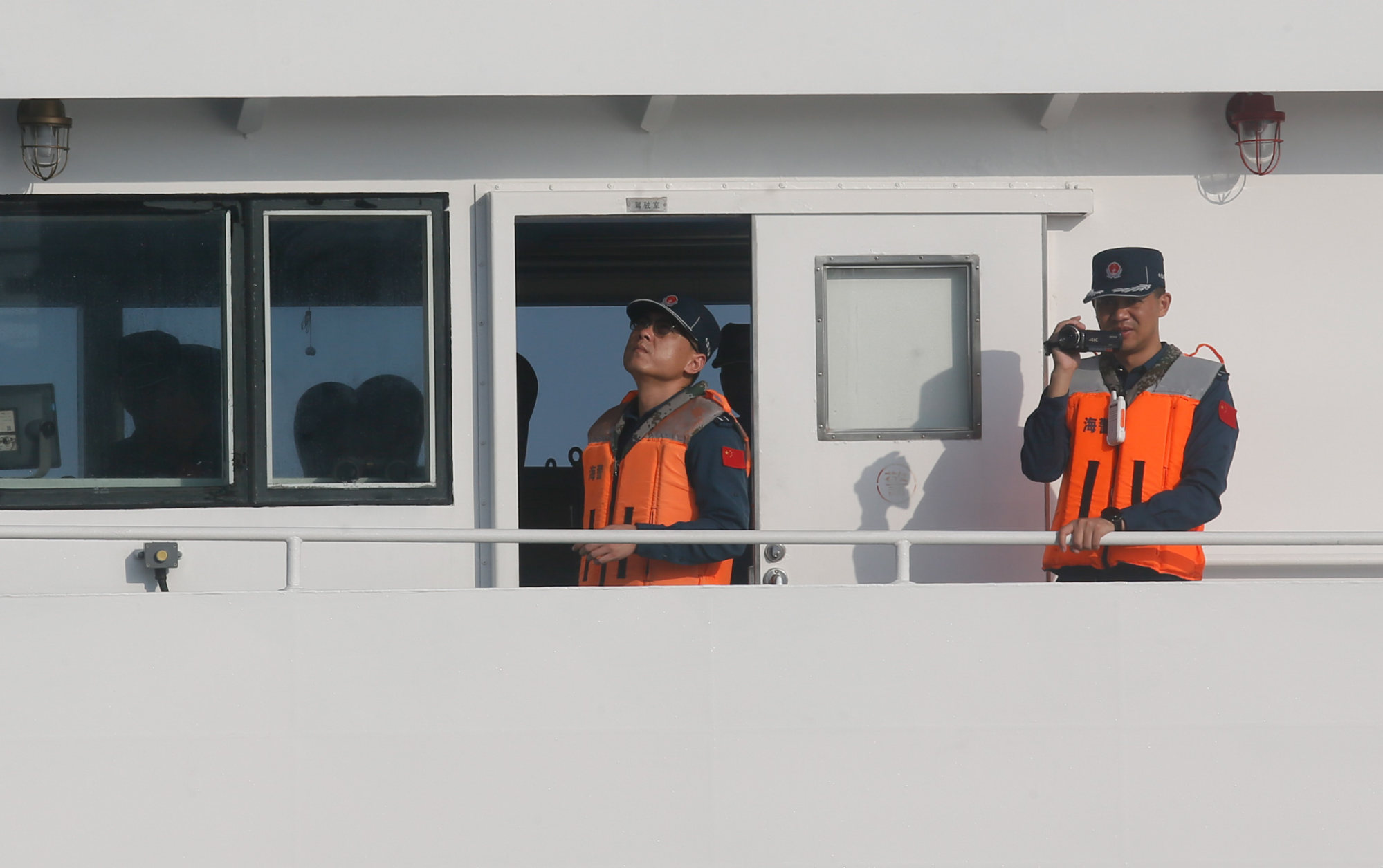
Political analyst Sherwin Ona, an associate professor at De La Salle University, said the latest developments are very concerning and did not foresee an end to China’s growing aggression.
“I believe that China will continue this belligerent behaviour in the West Philippine Sea because of its strategic intent. This means control of the [South China Sea] as part of the national rejuvenation where territorial integrity is paramount,” Ona said, referring to Manila’s name for South China Sea waters that lie within its exclusive economic zone.
“Beijing will continue to push its historical and sovereignty narrative until it is normalised through its legal and diplomatic efforts,” he added. Manila must not relent in its efforts to internationalise the situation and remain transparent in dealing with issues in the West Philippine Sea, Ona said.
Philippine Defence Chief Gilberto Teodoro has urged Beijing to take its claims of sovereignty in the South China Sea to international arbitration
“If China is not afraid to state its claims to the world, then why don’t we arbitrate under international law?,” Teodoro told reporters on Monday, adding that Manila would not budge on its position.
US to fund a port on Philippine island near Taiwan. What will it be used for?
US to fund a port on Philippine island near Taiwan. What will it be used for?
Teresita Daza, a spokeswoman for the Department of Foreign Affairs, has summoned China’s chargé d’affaires in the country following the latest standoff at Ayungin Shoal in the West Philippine Sea, referring to Manila’s designation for the Second Thomas Shoal.
“China’s continued interference with the Philippines’ routine and lawful activities in its exclusive economic zone is unacceptable. It infringes upon the Philippines’ sovereign rights and jurisdiction,” Daza said.
On Sunday, National Security Adviser Eduardo Año, who also chairs the National Task Force for the West Philippine Sea, said Manila would not be deterred from resupplying its military outpost in the shoal.
“We will not be intimidated because it is our right and we have to protect our soldiers, our sailors there at BRP Sierra Madre,” he said.
Washington has condemned China’s “dangerous actions” over the incident, arguing the actions not only undermine regional stability but also display Beijing’s blatant disregard for international law.
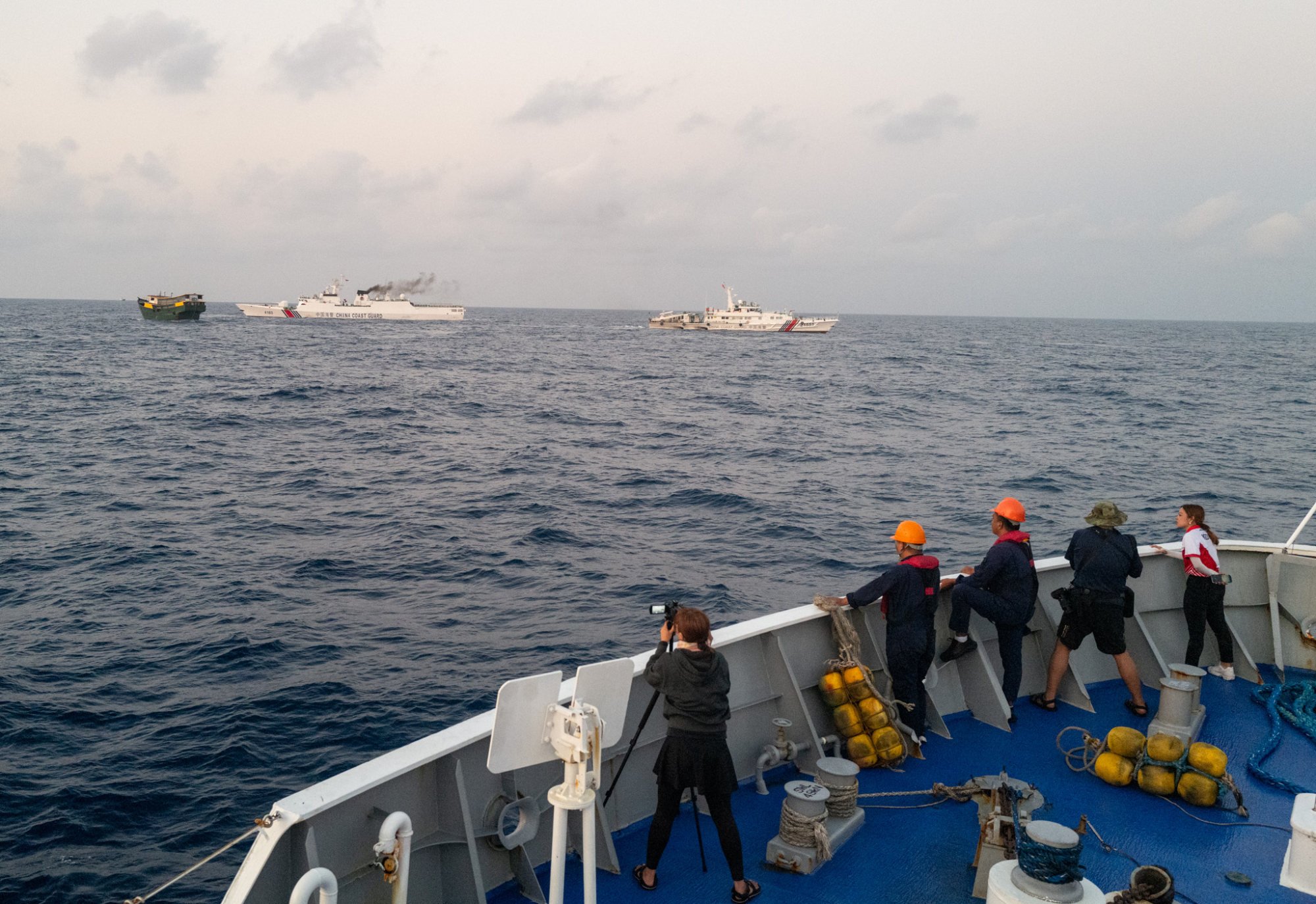
US Department of State spokesman Matthew Miller said the actions have critically hindered the delivery of essential supplies to Philippine soldiers.
“The People’s Republic of China ships’ repeated employment of water cannons and reckless blocking manoeuvres resulted in injuries to Filipino service members and significant damage to their resupply vessel, rendering it immobile,” he said.
“This incident marks only the latest in the PRC’s repeated obstruction of Philippine vessels’ exercise of high seas freedom of navigation and disruption of supply lines to this longstanding outpost,” Miller added.
A Philippine civilian coalition called Atin Ito! (“This Is Ours!”) has also denounced China’s latest actions.
Akbayan Party President Rafaela David, a co-convenor of Atin Ito, noted that the CCG’s “unjustified attack” using water cannons in Philippine waters happened just four months after a similar incident.
He said, “We demand an official apology from China for endangering the lives of our frontliners and violating international law. Absent an apology, the Chinese ambassador must leave our country.”

